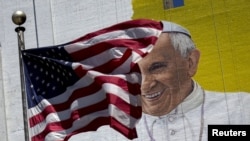He is the first “American” pope — but hails from a different part of the Americas. And people who follow him closely say Pope Francis is not a firm believer in the global leadership of the United States, which he will visit this month.
“I’ve read most of the things he’s ever written and said,” said Austen Ivereigh, author of a biography of Francis, “and he’s never really mentioned the United States. So for him, the United States is not the center of the world.”
“He’s got astronomic approval ratings and is a media icon,” wrote Cruxnow.com Vatican watcher John Allen Jr., “but there are also unmistakable signals that he sees the United States as part of the problem as much as the solution.”
In his 78 years, the Argentine-born Jorge Bergoglio has never set foot in this country. But while his esteem for it may be less than that of his predecessors — the fiercely anti-communist John Paul II or even the conservative Benedict XVI — some of the key themes of his papacy do touch on America’s place in the world, especially its economic primacy.
Francis has, in the words of Allen, a “clear preference for the peripheries of the world as opposed to its perceived centers.”
During a trip this year to South America, Francis visited three of the continent’s poorest countries. In Bolivia, he called unbridled capitalism “the dung of the devil.” His encyclical on climate change, issued last May, has been criticized here for rejecting market-based solutions and putting the onus for overcoming global warming on wealthy nations.
Migrants' plight
He has drawn attention to the plight of migrants, such that many Hispanic Americans hope he will counter the anti-immigrant sentiment that has entered mainstream political discourse by way of Republican presidential candidate Donald Trump.
Some of his anti-capitalist rhetoric has provoked a rebuke from economic conservatives, including U.S. Catholics. In July, on his way home from Latin America, the pope said he would study what his U.S. critics had to say before this trip.
Nevertheless, Cardinal Donald Wuerl, archbishop of Washington, said the pope is not likely to wade into political issues while he is in the U.S.
“It’s a pastoral visit. He is coming as a spiritual leader, as a shepherd of souls,” Wuerl said in an interview. “Whatever we hear from him has to be heard and seen through that lens, that he has come not to talk politics, not to talk public policy, but to talk about the values that come out of the Gospel message.”
Wuerl, however, does expect Francis will appeal to both sides “to work together to address the needs of our brothers and sisters, especially the less fortunate.”
The president of the U.S. Conference of Catholic Bishops, Joseph Kurtz of Louisville, Kentucky, told VOA the pope is confronting both the political right and the left with the reality of their policies.
“That makes some people squirm,” he said.
Kurtz played down Francis’ recent drop in opinion polls, noting that his current 59 percent favorability rating is comparable to Pope Benedict’s just before his U.S. visit in 2008.
“Any politician in the United States would throw himself off the bridge to get the kind of lower levels that we’re talking about now,” Kurtz said.
Speeches at Congress, UN
The September 22-27 visit will take Francis to Washington, New York and Philadelphia. He will meet President Barack Obama at the White House and be the first pontiff to address the U.S. Congress. A speech before the U.N. General Assembly is also scheduled.
As was the case on his other overseas trips, Francis’ itinerary will alternate between powerful institutions and places of poverty and marginalization, such as a homeless shelter and a prison.
The visit will culminate in Philadelphia, an archdiocese that was once a bastion of American Catholicism and that has been plagued by scandal in the last decade. According to bishopaccountability.org, 136 priests have been suspended in the diocese because of allegations of sexual misconduct.
Francis will also be well aware of the thinning pews at churches across the country. The Pew Research Center estimates that four out of 10 American adults who were born Catholic no longer identify with the religion.
Ivereigh, the biographer, said that while the pope may not be awestruck by the United States, he does have a “natural affinity” with the country because his native Argentina is also a nation of immigrants and Francis himself, whose parents were Italian, could just as easily have been born in the U.S.
“He knows what the anxieties and the pastoral needs of this country are, and I think he will address them,” Ivereigh said.




